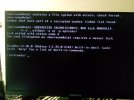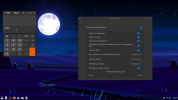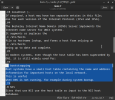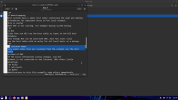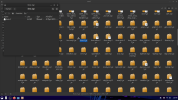I'm running Devuan on my Samsung 250 GB nvme and today when booting up the distro boots to an all black screen with white letters complaining that there was a unexpected inconsistency and that fsck will have to be ran manually.
I did some reading and I understand that the drive can not be mounted and there are several ways to handle this. And the fsck can be scheduled as well for the next boot.
From Grub I could enter Rescue Mode and run fsck OR> I could boot into Slackware or my Debian 12 Mate install and run fsck as well.
Devuan is installed on /dev/nvme0n1.
This is a triple booted system on an Asus Tuf Gaming custom built desktop. Here's the other 2 HDD's.
Debian 12 Mate is installed to the 1 TB HDD /dev/sdb and Slackware is installed to the WD /dev/sda
This has never been my experience in 10 plus years of running Linux..... so I'm asking what is the best approach?
Thanks in advance- Alex
I did some reading and I understand that the drive can not be mounted and there are several ways to handle this. And the fsck can be scheduled as well for the next boot.
From Grub I could enter Rescue Mode and run fsck OR> I could boot into Slackware or my Debian 12 Mate install and run fsck as well.
Devuan is installed on /dev/nvme0n1.
Code:
Disk /dev/nvme0n1: 232.89 GiB, 250059350016 bytes, 488397168 sectors
Disk model: Samsung SSD 970 EVO Plus 250GB
Units: sectors of 1 * 512 = 512 bytes
Sector size (logical/physical): 512 bytes / 512 bytes
I/O size (minimum/optimal): 512 bytes / 512 bytes
Disklabel type: dos
Disk identifier: 0xd8468b80
Device Boot Start End Sectors Size Id Type
/dev/nvme0n1p1 2048 486395903 486393856 231.9G 83 Linux
/dev/nvme0n1p2 486397950 488396799 1998850 976M 5 Extended
/dev/nvme0n1p5 486397952 488396799 1998848 976M 82 Linux swap / SolarisThis is a triple booted system on an Asus Tuf Gaming custom built desktop. Here's the other 2 HDD's.
Debian 12 Mate is installed to the 1 TB HDD /dev/sdb and Slackware is installed to the WD /dev/sda
Code:
Disk /dev/sda: 465.76 GiB, 500107862016 bytes, 976773168 sectors
Disk model: WDC WD5000AZLX-0
Units: sectors of 1 * 512 = 512 bytes
Sector size (logical/physical): 512 bytes / 4096 bytes
I/O size (minimum/optimal): 4096 bytes / 4096 bytes
Disklabel type: gpt
Disk identifier: 527DC993-23A2-442A-99F6-1F6D169ECE26
Device Start End Sectors Size Type
/dev/sda1 2048 6143 4096 2M Linux filesystem
/dev/sda2 972771328 976771071 3999744 1.9G Linux swap
/dev/sda3 6144 4200447 4194304 2G Linux swap
/dev/sda4 4200448 964696063 960495616 458G Linux filesystem
Partition table entries are not in disk order.
Disk /dev/sdb: 931.51 GiB, 1000204886016 bytes, 1953525168 sectors
Disk model: ST31000524NS
Units: sectors of 1 * 512 = 512 bytes
Sector size (logical/physical): 512 bytes / 512 bytes
I/O size (minimum/optimal): 512 bytes / 512 bytes
Disklabel type: dos
Disk identifier: 0xfc500ed3
Device Boot Start End Sectors Size Id Type
/dev/sdb1 * 2048 1917710575 1917708528 914.4G 83 Linux
/dev/sdb2 1917710576 1953520064 35809489 17.1G 82 Linux swap / SolarisThis has never been my experience in 10 plus years of running Linux..... so I'm asking what is the best approach?
Thanks in advance- Alex
Last edited:

